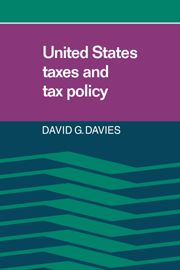Book contents
- Frontmatter
- Contents
- Preface
- 1 Economic foundations of U.S. tax policy
- 2 The individual income tax
- 3 Economic effects of individual income taxes and inflation
- 4 Expenditure versus income taxation
- 5 The taxation of capital gains
- 6 The corporation income tax
- 7 The corporation income tax and inflation
- 8 Social security payroll taxes
- 9 The value added tax
- 10 The sales tax
- 11 State taxes
- 12 Local government taxes
- 13 The distribution of tax burdens
- 14 Status of U.S. taxes and policy
- Appendix
- References
- Index
- Frontmatter
- Contents
- Preface
- 1 Economic foundations of U.S. tax policy
- 2 The individual income tax
- 3 Economic effects of individual income taxes and inflation
- 4 Expenditure versus income taxation
- 5 The taxation of capital gains
- 6 The corporation income tax
- 7 The corporation income tax and inflation
- 8 Social security payroll taxes
- 9 The value added tax
- 10 The sales tax
- 11 State taxes
- 12 Local government taxes
- 13 The distribution of tax burdens
- 14 Status of U.S. taxes and policy
- Appendix
- References
- Index
Summary
The main purpose of this book is to outline recent developments and ideas about taxes, tax policy, and theory in the United States. To begin to understand the crosscurrents of thinking about these issues, it is helpful to know something of the economic background and problems besetting the American economy.
Since the early 1970s, the large industrial sectors have suffered a long and debilitating recession. Traditional large-scale industries, such as mining and steel, are all but dying out and being replaced by more efficient foreign competitors. Moreover, rapidly growing industries, such as communications and computers, do not require vast amounts of the output of traditional sectors.
Large-scale shifts in the configuration of modern products and services have been taking place for some time. Nevertheless, it is now more than a decade since the American economy turned sour, and the growth in real per capita income has continued to sputter along with general economic conditions. Recoveries are relatively short-lived, and economic indicators are often lower than during the preceding upturn in activity. The economy appears to be in a long period of decline, relieved by periodic but anemic recoveries. Some of the ground lost during recession is regained, but advances are neither robust nor lasting. No single factor is responsible for this poor economic performance. Worldwide shocks to the system, such as the Viet Nam War, the movement to a generalized, floating foreign exchange, and the oil embargoes, have had notable effects.
- Type
- Chapter
- Information
- United States Taxes and Tax Policy , pp. xi - xivPublisher: Cambridge University PressPrint publication year: 1986

